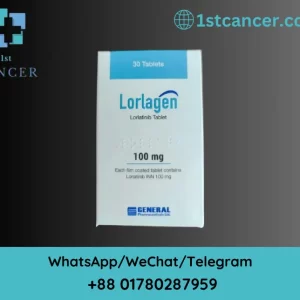Dacomitinib Tablets (Daconib) a formidable tyrosine kinase inhibitor (TKI), has emerged as a pivotal player in the field of targeted therapy, particularly in the treatment of non-small cell lung cancer (NSCLC). This innovative medication represents a significant stride in precision medicine. Offering a tailored approach to combatting specific molecular abnormalities implicated in cancer growth. The primary indication for Dacomitinib lies in the treatment of locally advanced or metastatic NSCLC with epidermal growth factor receptor (EGFR) mutations. Researchers have found that mutations in the epidermal growth factor receptor (EGFR) gene are common in some cases of non-small cell lung cancer (NSCLC).
Introduction of Dacomitinib Tablets (Daconib):
Dacomitinib Tablets (Daconib), an innovative tyrosine kinase inhibitor. Has emerged as a promising and targeted therapeutic option in the dynamic field of oncology. Developed to address the intricate signalling pathways implicated in cancer development and progression. Dacomitinib represents a significant advancement in precision medicine. This active pharmaceutical agent has

garnered attention for its potent inhibition of the epidermal growth factor receptor (EGFR). A key player in the molecular events driving tumour growth.
Originally crafted by researchers as a response to the need for more effective and targeted cancer therapies. Dacomitinib Tablets (Daconib) has undergone rigorous clinical evaluation and received regulatory approval for specific indications. Its mechanism of action centres around the blockade of EGFR signalling. Disrupting the pathways that fuel uncontrolled cell proliferation, survival, and metastasis.
This article delves into the pharmacological profile of Dacomitinib Tablets (Daconib). Exploring its mechanisms of action, clinical applications, and ongoing research endeavours aimed at expanding its role in cancer treatment. As we navigate the intricacies of this tyrosine kinase inhibitor. We aim to provide a comprehensive understanding of Dacomitinib’s impact on cancer care. Shedding light on its potential to reshape the landscape of therapeutic interventions in the ever-evolving field of oncology.
Background of Dacomitinib Tablets (Daconib):
Dacomitinib Tablets (Daconib), a tyrosine kinase inhibitor, has emerged from the crucible of targeted therapy research as a potent agent designed to confront the molecular intricacies driving cancer progression. Its origin lies in the imperative to address the challenges posed by dysregulated signalling pathways. Particularly those involving the epidermal growth factor receptor (EGFR), which plays a pivotal role in various malignancies.
The development of Dacomitinib Tablets (Daconib) represents a concerted effort by researchers and pharmaceutical innovators to refine and expand the arsenal of cancer therapeutics. It was crafted to disrupt EGFR-mediated signalling. Recognizing the significance of this receptor in orchestrating the cellular events that underlie uncontrolled tumour growth. By targeting EGFR.
Dacomitinib aims to impede the relentless signals that drive cancer cells to proliferate, evade apoptosis, and foster angiogenesis.
The journey of Dacomitinib Tablets (Daconib) from conceptualization to clinical reality involves a nuanced understanding of the molecular underpinnings of cancer biology. Researchers delved into the complexities of EGFR signalling pathways, unravelling the aberrations that contribute to the relentless growth of tumours. This deepened understanding paved the way for the design of Dacomitinib as a precise molecular tool capable of disrupting these pathways and offering a targeted approach to cancer treatment.
As a testament to its potential, Dacomitinib Tablets (Daconib) has undergone rigorous clinical evaluation. Leading to regulatory approvals for specific cancer indications. Its background is characterized by a commitment to advancing the field of oncology. Providing clinicians with a strategic and effective tool to combat cancers driven by aberrant EGFR signalling.
In the subsequent sections, we will explore the pharmacological intricacies of Dacomitinib. Its clinical applications, and the ongoing research endeavours aimed at unravelling its full therapeutic potential. The background of Dacomitinib Tablets (Daconib) is not merely a historical account but a testament to the relentless pursuit of precision in cancer therapy. With the ultimate goal of improving patient outcomes in the face of this complex and challenging disease.
Mechanism of Action Dacomitinib Tablets (Daconib):
Dacomitinib exerts its therapeutic influence through a robust and targeted mechanism of action. Primarily centred on the inhibition of the epidermal growth factor receptor (EGFR). As a tyrosine kinase inhibitor, Dacomitinib Tablets (Daconib) selectively hone in on EGFR and disrupt the intricate signalling cascades that fuel uncontrolled cell growth, survival, and metastasis in various malignancies.
-
EGFR Inhibition:
Dacomitinib’s key mode of action revolves around its potent inhibition of EGFR. A transmembrane receptor belonging to the ErbB family. By binding to the ATP-binding site of EGFR’s tyrosine kinase domain. Dacomitinib Tablets (Daconib) impede the autophosphorylation of EGFR. A crucial step in the activation of downstream signalling pathways.
-
Downstream Signaling Pathways:
EGFR activation initiates a cascade of intracellular signalling events, including the RAS/RAF/MEK/ERK and PI3K/AKT/mTOR pathways. Which regulate cell proliferation, survival, and angiogenesis. By disrupting EGFR signalling. Dacomitinib Tablets (Daconib) attenuate these pathways, leading to the inhibition of tumour cell growth and survival.
-
Angiogenesis Inhibition:
EGFR activation is closely linked to the process of angiogenesis, the formation of new blood vessels that supply nutrients to tumours. Dacomitinib’s inhibition of EGFR contributes to the suppression of angiogenesis. Thereby depriving tumours of the vascular support necessary for their sustained growth.
-
Cell Cycle Arrest and Apoptosis Induction:
The interference with EGFR signalling by Dacomitinib Tablets (Daconib) induces cell cycle arrest and promotes apoptosis in cancer cells. This halting of the cell cycle and induction of programmed cell death are pivotal mechanisms through which Dacomitinib exerts its anti-cancer effects.
-
Overcoming EGFR Resistance:
Dacomitinib has demonstrated the ability to overcome certain forms of resistance associated with other EGFR inhibitors. Making it a valuable therapeutic option in cases where resistance mechanisms pose challenges to treatment efficacy.
The multifaceted mechanism of action of Dacomitinib Tablets (Daconib), with its focus on the disruption of EGFR-mediated signalling, positions it as a targeted therapy with broad applications in oncology. This comprehensive approach, targeting not only the primary tumour but also the supportive processes such as angiogenesis. Reflects the precision and sophistication of Dacomitinib’s impact on cancer biology. As we delve into the clinical applications of Dacomitinib. The significance of its mechanism of action becomes increasingly apparent in the context of advancing cancer care.
Clinical Uses of Dacomitinib Tablets (Daconib):
Dacomitinib Tablets (Daconib) has emerged as a valuable therapeutic option in the treatment of certain malignancies. Owing to its targeted inhibition of the epidermal growth factor receptor (EGFR). The clinical applications of Dacomitinib underscore its role in addressing cancers driven by aberrant EGFR signalling. Marking it as a promising agent in the oncological armamentarium.
-
Non-Small Cell Lung Cancer (NSCLC):
Dacomitinib has gained prominence in the treatment of advanced or metastatic non-small cell lung cancer (NSCLC). It is specifically indicated for patients with EGFR mutation-positive NSCLC. Demonstrating efficacy in delaying disease progression and improving overall survival through its potent inhibition of EGFR signalling.
-
EGFR-Mutated Lung Cancers:
Dacomitinib Tablets (Daconib) is particularly beneficial in the subset of lung cancers characterized by activating mutations in the EGFR gene. This includes common mutations such as exon 19 deletions and exon 21 (L858R) substitutions. In clinical trials, Dacomitinib has shown superiority over other EGFR tyrosine kinase inhibitors. Solidifying its role in the first-line treatment of EGFR-mutated NSCLC.
-
Ongoing Research in Other Cancers:
While its primary indication lies in NSCLC, ongoing research endeavours are exploring the potential of Dacomitinib Tablets (Daconib) in other cancer types. Investigational studies are investigating its efficacy in head and neck squamous cell carcinoma (HNSCC). Where aberrant EGFR signalling is also a driving force in tumour progression.
-
Adjuvant and Neoadjuvant Settings:
Dacomitinib is being investigated in various settings, including adjuvant and neoadjuvant therapy. To assess its role in preventing recurrence or improving surgical outcomes in certain cancers. These studies aim to refine treatment approaches and potentially extend the application of Dacomitinib Tablets (Daconib) to different stages of cancer management.
-
Management of EGFR Resistance:
Dacomitinib has demonstrated effectiveness in overcoming resistance to other EGFR inhibitors. Offering a strategic option in cases where resistance mechanisms pose challenges to treatment success. This aspect of its clinical utility is particularly relevant in the context of personalized medicine and evolving resistance patterns in cancer care.
The clinical uses of Dacomitinib Tablets (Daconib) highlight its significance in EGFR-driven cancers, particularly in NSCLC where targeted therapies have shown remarkable efficacy. As research continues to unfold, Dacomitinib’s role may expand further. Contributing to the evolving landscape of precision medicine and the quest for effective and tailored therapies in oncology.
Clinical Trials and Research of Dacomitinib Tablets (Daconib):
Dacomitinib Tablets (Daconib) have undergone rigorous evaluation through numerous clinical trials, marking their journey from the laboratory to clinical practice and shedding light on their efficacy. Safety profile, and potential applications in various cancer settings. These trials are designed to refine treatment approaches and explore new avenues. Contribute to the evolving landscape of Dacomitinib in oncology.
-
ARCHER 1050 Trial in NSCLC:
The pivotal ARCHER 1050 trial played a key role in establishing Dacomitinib’s efficacy in advanced non-small cell lung cancer (NSCLC) with EGFR-activating mutations. This phase III trial compared Dacomitinib Tablets (Daconib) to gefitinib, another EGFR tyrosine kinase inhibitor, as a first-line treatment. The results demonstrated superior progression-free survival and overall response rates with Dacomitinib. Solidifying its position in the therapeutic armamentarium for EGFR-mutated NSCLC.
-
ARCHER 1009 Trial in Resistant NSCLC:
The ARCHER 1009 trial focused on patients with NSCLC who had developed resistance to first-generation EGFR inhibitors. Dacomitinib Tablets (Daconib) showcased its ability to overcome resistance, offering a viable treatment option for patients facing challenges with existing therapies. This trial emphasized Dacomitinib’s potential in managing resistance mechanisms in EGFR-mutated NSCLC.
-
ARCHER 1028 Trial in Advanced Solid Tumors:
The ARCHER 1028 trial expanded the exploration of Dacomitinib’s potential by investigating its efficacy in advanced solid tumours beyond lung cancer. This phase I trial assessed the safety and tolerability of Dacomitinib Tablets (Daconib) in patients with various solid tumours. Providing insights into its broader applicability across different cancer types.
-
Ongoing Trials in Head and Neck Squamous Cell Carcinoma (HNSCC):
Beyond lung cancer. Ongoing research is exploring Dacomitinib’s role in head and neck squamous cell carcinoma (HNSCC). Where aberrant EGFR signalling is a critical driver of tumour progression. Clinical trials aim to evaluate its efficacy in HNSCC, potentially expanding its clinical applications.
-
Adjuvant and Neoadjuvant Settings:
Investigative studies are assessing Dacomitinib’s potential in adjuvant and neoadjuvant settings. Exploring its role in preventing recurrence or improving surgical outcomes in various cancers. These trials contribute to a deeper understanding of Dacomitinib’s impact across different stages of cancer management.
As Dacomitinib Tablets (Daconib) continues to undergo scrutiny in clinical trials. The findings from these studies shape its clinical applications and pave the way for future developments. The research landscape surrounding Dacomitinib reflects a commitment to advancing precision medicine and tailoring therapeutic strategies to the unique molecular characteristics of each patient’s cancer.
Potential Side Effects of Dacomitinib Tablets (Daconib):
The use of Dacomitinib, like many targeted cancer therapies, may give rise to a spectrum of potential side effects. Healthcare providers and patients must be vigilant about these adverse events to ensure early detection and management. The following details some of the potential side effects associated with Dacomitinib Tablets (Daconib):
-
Skin Rash:
Dacomitinib is known to cause skin-related side effects, commonly presenting as a rash. This rash may be mild to moderate in severity and may manifest as erythema, papules, or pustules. Proactive skin care measures and, in some cases, dose adjustments may be considered to manage these dermatological effects.
-
Diarrhoea:
Gastrointestinal effects, including diarrhoea, have been reported in patients taking Dacomitinib. Close monitoring and prompt intervention, including anti-diarrheal medications, are essential to prevent dehydration and other complications associated with persistent diarrhoea.
-
Paronychia (Nail Inflammation):
Inflammation of the nails, known as paronychia, is a potential side effect of Dacomitinib Tablets (Daconib). Patients may experience pain, swelling, or infection around the nails. Proper nail care and, in severe cases, dose modifications may be considered to alleviate these symptoms.
-
Stomatitis (Mouth Sores):
Stomatitis, characterized by the development of mouth sores, is a recognized side effect of Dacomitinib. Good oral hygiene practices and the use of oral care products may help manage and alleviate discomfort associated with stomatitis.
-
Decreased Appetite and Weight Loss:
Some individuals taking Dacomitinib may experience a decrease in appetite, leading to weight loss. Healthcare providers may recommend nutritional support and dietary interventions to address these concerns and maintain the patient’s overall well-being.
-
Fatigue:
Fatigue is a common side effect associated with Dacomitinib treatment. Patients may experience a sense of tiredness or weakness, impacting daily activities. Adequate rest and open communication with healthcare providers about fatigue levels are important for effective management.
-
Ocular Effects:
Dacomitinib Tablets (Daconib) use has been associated with ocular effects, such as dry eyes and conjunctivitis. Healthcare providers may recommend regular eye examinations and the use of artificial tears to manage these ocular symptoms.
-
Hepatic Effects:
Dacomitinib may impact liver function, leading to elevated liver enzyme levels. Healthcare providers must regularly monitor liver function through blood tests and may consider adjusting the dose if they observe significant hepatic effects.
-
Interstitial Lung Disease (ILD):
In rare instances, interstitial lung disease. A serious and potentially life-threatening side effects has been linked to Dacomitinib. Close monitoring for respiratory symptoms and prompt intervention are essential if there are suspicions of ILD.
-
Cardiovascular Effects:
Cardiovascular events, such as hypertension and cardiac dysfunction, may occur with Dacomitinib Tablets (Daconib) use. Regular blood pressure monitoring and cardiac assessments are important to manage and mitigate potential cardiovascular risks.
Patients undergoing Dacomitinib Tablets (Daconib) treatment should maintain open communication with their healthcare team, promptly reporting any new or worsening symptoms. This collaborative approach ensures timely intervention and optimization of the balance between therapeutic benefits and potential side effects.
Emerging Trends and Developments of Dacomitinib Tablets (Daconib):
Dacomitinib Tablets (Daconib), a pivotal player in targeted cancer therapy, continues to be a focal point of active research. With emerging trends and developments shaping its trajectory within the field of oncology. These trends reflect the dynamic nature of cancer research and the ongoing pursuit of more effective and precise therapeutic strategies.
-
Next-Generation EGFR Inhibitors:
As researchers delve deeper into the intricacies of EGFR signalling pathways. There is a growing interest in developing next-generation EGFR inhibitors. These compounds aim to address resistance mechanisms observed with current EGFR inhibitors. Potentially expanding the efficacy of targeted therapies like Dacomitinib Tablets (Daconib). Ongoing preclinical and early-phase clinical trials are investigating novel EGFR inhibitors to refine treatment options for patients with EGFR-driven malignancies.
-
Exploration in Rare Cancers:
Emerging trends underscore the exploration of Dacomitinib’s efficacy in rare and less common cancers. Investigative studies are extending beyond well-established indications, such as NSCLC, to evaluate its potential in cancers with unique genetic profiles. This trend aligns with the broader movement towards precision medicine. Wherein clinicians tailor therapies to the specific molecular characteristics of individual tumours
-
Liquid Biopsies for Monitoring Resistance:
The evolution of liquid biopsy technologies is influencing the way researchers monitor resistance mechanisms to drugs like Dacomitinib Tablets (Daconib). Liquid biopsies offer a minimally invasive method to detect and monitor genetic alterations in circulating tumour DNA. This trend holds promise for identifying resistance mutations earlier. Allowing for timely adjustments to treatment strategies and potentially improving patient outcomes.
-
Patient Stratification based on Resistance Profiles:
An emerging trend involves refining patient stratification based on the specific resistance profiles observed during treatment. Understanding the genetic alterations that contribute to resistance enables clinicians to tailor therapeutic approaches more precisely. This trend aligns with the broader paradigm shift towards individualized treatment strategies in oncology.
-
Real-world Evidence Studies:
Beyond the controlled environment of clinical trials, there is a growing emphasis on real-world evidence studies. These studies provide insights into the practical outcomes, and tolerability. Effectiveness of Dacomitinib Tablets (Daconib) in diverse patient populations outside the confines of clinical trials. Real-world evidence contributes valuable information that complements traditional clinical trial data. Offering a more comprehensive understanding of the drug’s impact on routine clinical practice.
-
Exploration of Biomarkers for Predictive Response:
Researchers are actively exploring biomarkers that may serve as predictive indicators of response to Dacomitinib. Identifying specific genetic or molecular markers associated with favourable responses can aid in patient selection and further refine treatment strategies. This trend aligns with the ongoing efforts to personalize cancer treatment based on individual tumour characteristics.
These emerging trends collectively highlight the commitment of the scientific community to advancing the field of targeted therapies. The evolving landscape of Dacomitinib Tablets (Daconib) research holds the promise of refining its clinical applications. Overcoming challenges associated with resistance, and expanding its role in the diverse landscape of oncology.
Conclusion of Dacomitinib Tablets (Daconib):
In conclusion, promising trends and ongoing developments mark the dynamic landscape of Dacomitinib in oncology. Underscoring its significance as a targeted therapeutic option. Researchers, delving into the intricacies of EGFR signalling and resistance mechanisms. Are positioning Dacomitinib for continued refinement and expansion within the realm of cancer treatment.
The exploration of next-generation EGFR inhibitors, the extension of Dacomitinib’s efficacy into rare cancers. The evolving landscape of patient stratification based on resistance profiles all contribute to a narrative of progress in precision medicine. These trends reflect a commitment to overcoming challenges and tailoring therapeutic approaches to the unique characteristics of individual tumours.
The integration of liquid biopsy technologies for monitoring resistance, the emphasis on real-world evidence studies. The quest for predictive biomarkers underscores a shift towards a more personalized and evidence-driven approach to Dacomitinib treatment. These developments not only contribute to the scientific understanding of the drug but also hold the potential to enhance clinical outcomes and patient experiences in the years to come.
As Dacomitinib continues to be at the forefront of targeted therapies, the collaborative efforts of researchers. Clinicians and pharmaceutical innovators are driving the evolution of its role in cancer care. The conclusion drawn from the current trends and ongoing research is one of optimism and anticipation. As Dacomitinib navigates the complexities of cancer biology towards a future characterized by increasingly effective and tailored therapeutic strategies.





